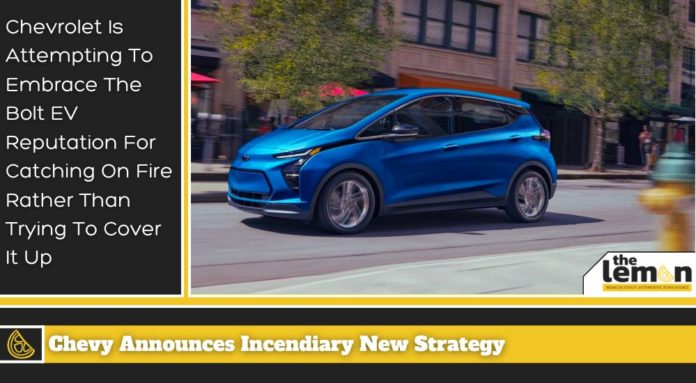If there’s one thing I know about the auto industry, it’s this: Lee Iacocca once celebrated a major promotion by eating a whole goose. The other thing about the industry that I can say with some confidence, just not as much as that goose thing, is that manufacturers will always follow successful trends. Why innovate when you can look at what’s worked and just do more of that? It’s in this spirit that Chevy has announced a new strategy for their upcoming Battery Electric Vehicles (BEVs) that is turning a lot of heads.
The Bolt EV Experiment
In the last couple of years, something interesting has been happening, and by interesting, I mean something that should’ve been disastrous but has actually been an overall victory. By now, I’m sure you know that Chevy had a slight problem with their Bolt EV models lighting on fire. And, just to be clear, I don’t mean erupting into flames after a high-speed collision or due to overheating from improper maintenance––I mean they’ll just decide to light themselves on fire. If you’ve ever wondered if spontaneous combustion is a real thing, the answer is yes, and Exhibit A is the Chevy Bolt EV.
There were well over a dozen cases of Bolt EV models bursting into flames while charging or after charging. Most alarming of all, these car fires were incredibly difficult for fire departments to put out. On numerous occasions, they’d be called to a scene, put out the fire after dousing the vehicle for an hour, and then watch it reignite shortly after or have to be called back when the Bolt EV once again lit itself on fire. One time, the fire department put the car out, were called back an hour later to put it out a second time, then towed the vehicle to a dealership, where it promptly lit itself on fire a third time.
After largely ignoring the problem and trying to solve it with cheap software fixes for over a year, Chevy finally announced they’d actually address the problem with a full recall. Every Bolt EV model ever made has been recalled so the battery can be swapped to a new one that’s less inclined toward self-immolation. This full recall is expected to cost about $2 billion, which would be catastrophic for GM, except LG Energy Solutions––the company that made the batteries––has agreed to cover $1.9 billion of the costs.
Compelling Results
I applaud seeing a car company try such a bold initiative––most other brands would assume customers don’t want a vehicle that lights itself on fire. Not Chevy, though; they were ready to charge ahead and see what customers think about little details like having a vehicle that will try to burn down your house or being told you can’t park in a garage because businesses are worried about the inflammatory nature of your vehicle. And what do people think?
In the third quarter of 2022, sales of the Chevy Bolt EV were up 226% from a year ago. It’s not only up from when sales were incredibly low, but Chevy actually had its best quarter ever for the Bolt EV. Demand is so high that Chevy is increasing production next year from the 44,000 Bolt EV models they made in 2022 to more than 70,000 vehicles in 2023.
Looking Ahead to Ultium
As a response to this overwhelming feedback, Chevy has announced they’ll be using what they’ve learned in their next generation of BEV models. All upcoming vehicles, including the Silverado and Blazer EVs, that use their new Ultium platform are being modified to more easily burst into flames. There’s no word at this time if other GM brands are following suit, so your GMC Hummer EV might not be prone to conflagration, but for now, at least, Chevy is betting on consistency.
According to one source I spoke to, they’re working on advanced software to help ensure most of these fires occur while at least one person is inside the vehicle to deliver a truly next-generation experience. Based on the track record of the Bolt EV, these fires will only make people want them more and drive sales beyond expectations. What could be more exciting than driving a car that can simply destroy itself on a whim?
Editor’s Note: We reached out to Chevy for comment, but they were unwilling to respond. After several phone calls, we finally left a message but haven’t heard back from them yet. We drove over there, and the lights were on, but we noticed someone looking out from GM’s headquarters, peeping out from the curtains, and then they turned the lights off. While we’re not suggesting that GM is purposefully ducking our calls, we saw several people go inside the building and were informed they were all away on vacation, visiting their girlfriend up in Canada – seems pretty suspicious to us. Thank you.












